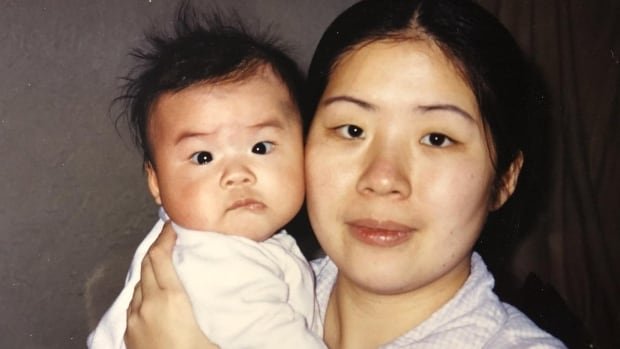My parents sent me to live with my grandparents in China. It changed our relationship forever

This First Person column is written by Sophie Chen, who lives in Montreal. For more information about CBC’s First Person stories, please see the FAQ.
I was less than a month old when my parents started an Asian foods importation company in the United States, leaving China in the hope of a better life in North America. As an owner of the business, my dad didn’t see profits for a while. Our family’s only income came from my mom who also worked as the company’s secretary. Our family relied on her minimum wage to make ends meet.
Babies are expensive. Paying my nanny alone cost half my parents’ monthly salary. So, when I was two, they made the difficult decision to send me to live with my grandparents in Xiamen in southeastern China. Although I don’t remember this moment, I have a vague feeling I wasn’t told that I wouldn’t see my parents for three years. When we arrived at my grandparents’ place, my mom recounts that I ran into their apartment fearlessly, not even saying goodbye.
I met my parents for the second time when I was five, in 2009. I had flown from Beijing with my grandfather who handed me off to my father who met me at a layover city. When we arrived home in Philadelphia, my mom opened the storefront door on the side of a Chinese restaurant. I had forgotten what she looked like. I recall she had long black hair with subtle strands of white intertwined and hard lines that could’ve been from either smiling or frowning too much.
I proudly handed her the bread I had saved from the plane. She took it and said thank you, but what I noticed more was the smile plastered on her face — happy to see me of course, but also containing what I assumed to be the awkwardness of meeting one’s tiny daughter for the first time in three years. I hugged her while chirping a rehearsed, “I missed you, Mommy,” as my grandparents had instructed.

It was far past any child’s bedtime, so my mother ushered me inside, up the narrow stairs to the second-floor apartment where my parents lived. After I got settled, my mom helped me get into the shower, and I saw her look at me with a start. I now know why. My ribs were showing, and my limbs were thin like chopsticks. The last time she had seen me, I had been a particularly chubby baby.
She tucked me into bed, still looking upset. As I fell asleep, I heard rants about my life in China through the thin walls: my boarding preschool, its subpar cafeteria, even about my grandparents.
“How come after a month in that school, she looks like she hasn’t eaten for days? Didn’t they notice?”
Learning about what matters
The following year, when I was in kindergarten, I remember happily rushing to my mom across the playground. I had a surprise for her — some leftover chicken nuggets from the cafeteria. In my six-year-old mind, I was sure that this was the greatest gift in the world.
“Mom! Look!” I said, expecting some compliments or even a hug. Instead, my mother frowned, peering at me as she bent down to match my height.
“Leftover nuggets? These are no good! How many times have I told you the story of your grandfather? You know he died from eating leftovers too much. Very sad. Don’t take any next time. We have food at home.”
I learned two things from that day. First, never give my mom chicken nuggets. Instead, sneak them inside the backpack and give them to Dad. And second, never call her “Mom” sweetly out of nowhere. She’d already come to associate being addressed nicely in English with the idea that bad news would be coming next. To this day, when reporting a bad grade, I still preface the subject with a sweetly voiced “Mom.”
On the playground, my mom spotted the nearest trash can and threw the box of nuggets into it. Stunned by her coldness, I slunk into the car. The car ride home was silent.
I went into my room and began to practise tracing letters. Shortly later, my mom arrived in the doorway, stealthily placing a plate of red dragon fruit on my desk. My favourite. She left silently and discreetly, just as she had entered.
The dragon fruit was sweet.
That was a day when I was on my way to learning what mattered in my family. It probably wasn’t going to be flowery words of affection. It wasn’t going to be lots of hugs. It was slowly becoming clear that I was going to know I was loved by that fruit plate that would always seem to appear, silently, on the table.

My family quickly felt like home, with my mom making conscious efforts to catch up after our mother-daughter separation. During my kindergarten year, she learned that I love eating crab (“You would suddenly shut up when I gave you crabs,” she would say), that my favourite American show was Scooby-Doo and that my ideal day trip is to discover the never-ending isles of Ikea. By the time I started primary school in Montreal, my mom and I were inseparable.
Now that we live in Montreal, moments when my mom feels like a stranger to me are rare. Sometimes, she sighs about not having seen me grow up. When I think about my childhood, I sometimes feel regretful, but I understand that it was the best decision they could make at the time.

Today, our relationship is stronger than ever — maybe our separation when I was a toddler has made us closer somehow.
And it’s my turn to now take care of her. Sometimes, I place a plate of watermelon on my mom’s desk as she takes her afternoon nap, and the bond between us is unshakable and silent.
Do you have a compelling personal story that can bring understanding or help others? We want to hear from you. Here’s more info on how to pitch to us.
Source link



